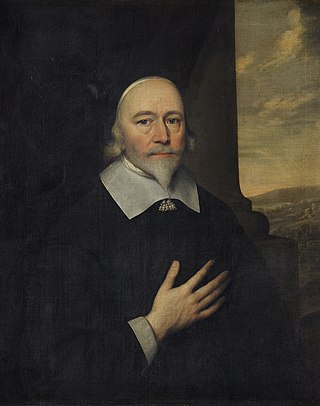Notes*-
![]() This article incorporates text from a publication now in the public domain : "Wild, Robert". Dictionary of National Biography . London: Smith, Elder & Co. 1885–1900.
This article incorporates text from a publication now in the public domain : "Wild, Robert". Dictionary of National Biography . London: Smith, Elder & Co. 1885–1900.
[1] Robert Wild(Wylde)(1617-1659) was an English clergyman and poet, known for his wit and controversial writings. Despite his presbyterian views, Wild held royalist in political beliefs and was eventually evicted from the position in 1662.. John Dryden called him 'the Wither of the city.' He wrote extensively, often anonymously and controversially. [2]
Robert Wild was born to Robert Wild, a shoemaker of St. Ives, Huntingdonshire. After a private school education at St. Ives, he was admitted as a sizar to St. John's College, Cambridge, on 26 January 1632, and was made a scholar in 1634 graduating with Bachelor of Arts in 1636 followed by a Masters of Arts in 163. He later obtained a Bachelor of divinity from Oxford on 1 November 1642. He was made a Doctor of Divinity through royal mandate on 9 November 1660. [2]
As a youth , Wild held strong Puritan beliefs, and was appointed to the living of Aynhoe, Northamptonshire, by order of the House of Commons on 22 july1646. Wild's reputation for his wit and controversial views gave his friend a renowned theologian Richard Baxter so much discomfort that he visited Aynhoe, intending to rebuke him. However, after having sat in the corner of the church, and listened to his sermon, he changed his mind and instead asked Wild to rebuke him sharply, for having listened to the reports! [2]
Wild was ejected by the Act of Uniformity 1662. He lived at Aynhoe a year or two after 1662, supported amongst others by Sir John Baber, Charles II's physician, to whom, for a timely gift of ten crowns, Wild addressed The Grateful Nonconformist (1665). Later Wild was living at Oundle. He was indicted in July 1669 at Warwick and Coventry assizes for keeping a conventicle. [2]
Robert wild was married to Joyceand they had at least two sons, both of whom became conforming ministers. He took his last breathe at Oundle due to apoplexy and was laid to rest on 30 July 1679. [2]
Robert wild notable work is ''Iter Boreale''. A poem appreciating the Successful and Matchless March of the Lord General George Monk from Scotland to London. Published on 23 April 1660, which gained its popularity as a tribute to General George Monck. Robert Wild poems were published by John Hunt in 1870. [2]
![]() This article incorporates text from a publication now in the public domain : "Wild, Robert". Dictionary of National Biography . London: Smith, Elder & Co. 1885–1900.
This article incorporates text from a publication now in the public domain : "Wild, Robert". Dictionary of National Biography . London: Smith, Elder & Co. 1885–1900.

Thomas Fuller was an English churchman and historian. He is now remembered for his writings, particularly his Worthies of England, published in 1662, after his death. He was a prolific author, and one of the first English writers able to live by his pen.

Herbert Marsh was a bishop in the Church of England.

Henry King was an English poet who served as Bishop of Chichester.

Joseph Beaumont was an English clergyman, academic and poet.
Gilbert Clerke (1626–c.1697) was an English mathematician, natural philosopher and Socinian theological writer.
Thomas Horton D.D. was an English clergyman, Professor of Divinity at Gresham College in London, and President of Queens' College, Cambridge.
Robert Mapletoft was an English churchman and academic, Master of Pembroke College, Cambridge and Dean of Ely.

Richard Love (1596–1661) was an English churchman and academic, Master of Corpus Christi College, Cambridge, Lady Margaret's Professor of Divinity, member of the Westminster Assembly, and Dean of Ely.

David Dickson (1583–1663) was a Church of Scotland minister and theologian.
Martin Mason was an early English Quaker, often imprisoned for his beliefs, and a prolific writer of controversial tracts.

Sir Francis Bassett of Tehidy in the parish of Illogan in Cornwall, was Sheriff of Cornwall, a Vice-Admiral of North Cornwall, and Recorder of St Ives. His portrait by Vandyck was formerly displayed at Tehidy. He appears to have been a sportsman, much addicted to hawking and cock-fighting.

Arabella Hunt (1662–1705) was an English vocalist and lutenist, celebrated for her beauty and talents.
John Barker (1682–1762) was an English presbyterian minister.
John Reading (1588–1667) was an English priest of Calvinist views and Biblical commentator.
Henry Foulis (1638–1669) was an English academic theologian and controversial author.
James Smith was a clergyman who became Archdeacon of Barnstaple in 1660. He was also much admired for his wit, and collections of his satirical verse were published in the 1650s.
John Hunt, D.D. was a Scottish cleric, theologian and historian. He was known for his liberal views, and his work Religious Thought in England.
Robert Pory or Porey (c.1608?–1669) was an English churchman, archdeacon of Middlesex from 1660.
Edmund Gayton (1608–1666) was an English academic, physician and author, now considered a hack writer.
Martin Lluelyn (1616–1682) was a poet and physician of probable Welsh ancestry.